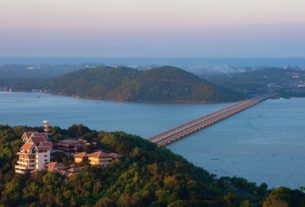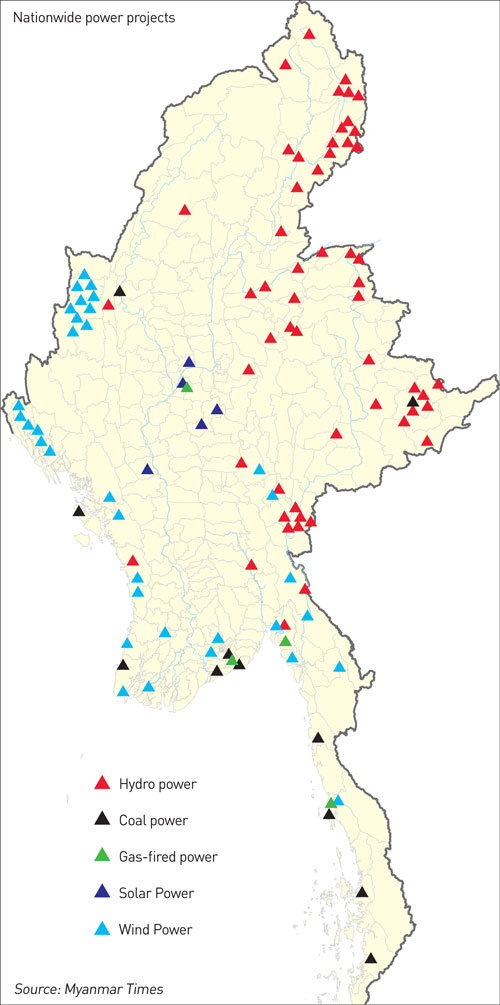 Hotel Construction Threatens Myanmar’s World Heritage Site at Bagan
Hotel Construction Threatens Myanmar’s World Heritage Site at Bagan
Despite a prohibition on new construction in Myanmar’s World Heritage site, new hotels and guesthouses continue to be built within the protected property zone of Bagan, according to local residents.
The 50-sq.-km property zone is an area “that has been demarcated as containing most of the cultural heritage attributes” by the Myanmar government and UNESCO.
Myanmar’s government submitted a management plan for Bagan to UNESCO in January 2018 as part of the World Heritage nomination process. The plan includes strategies and guidelines to resolve issues like hotels, booming tourism, development, environmental problems and natural disasters.
Calling the visitor accommodation issue “one of the greatest threats” to the property zone, the government commits in the management plan to assessing all existing hotels and guesthouses within the zone to ensure that they do not impact the heritage site. The plan includes relocation of hotels currently inside the property zone by 2028.
However, new projects continue to be developed within the property zone, with new properties being built just a stone’s throw from ancient monuments and heavy machinery being used in the construction of those properties, said Bagan resident U Myo Hset San.
The head of the Department of Archaeology and National Museum, officials of the township general administration department and police made a surprise inspection on Jan. 7 at the construction site of Eden Hotel and Resort Bagan—a hotel project being developed by Eden Group Company—after locals reported construction near Pagoda No. 1358 in the hotel compound and that a bulldozer was being used.
U Myo Hset San said a swimming pool and changing rooms are being built some 12 feet from the ancient pagoda. There are reportedly 24 ancient pagodas and stupas in the compound of Eden Hotel and Resort Bagan.
According to the Department of Archaeology and National Museum (Bagan branch), there are 15 hotels in protected property zone—eight of them are in operation and seven others are still under construction. The 50-acre Eden Hotel and Resort Bagan is one of the seven under construction.
Director Dr. Than Htike of Department of Archaeology and National Museum (Bagan branch) said he did not see the use of a bulldozer during inspection.
“When we inspected the site, we didn’t see them exceeding the permission of the regional government,” he said. Eden Group Company received permission to build the hotel around 2005, but it has not yet been completed, he said.
When asked by The Irrawaddy, chairman of Eden Group Company, U Chit Khine, said he had no knowledge of the surprise inspection and said the hotel project is complete by 70 percent. Regarding the construction of properties near ancient monuments, he said: “Archaeologists had made careful inspections before [the authorities] granted permission.”
Locals have raised questions about the project since it is still under construction nearly 17 years after it was first permitted.
Asked if he would follow the government’s relocation proposal in 2028 as stated in the management plan, U Chit Khine said his intention was to go ahead with building the hotel.
“As you see the government is inspecting development sites with experts and advisors. They are still holding discussions. We don’t know the result yet. If all the other hotels are obliged to comply, we would do so,” said the chairman.
He explained that the hotel was permitted by the military government because it was located in what was then the hotel zone, and that construction started under its successor U Thein Sein’s administration. That hotel zone was later scrapped and became an extension of the protected property zone.
Continued construction of buildings in the property zone violates the 2019 Protection and Preservation of Cultural Heritage Regions Law, heritage experts said.
Daw Ohmar Myo, a former UNESCO coordinator now involved in heritage management of the ancient capital, said: “They gave an excuse that they received the construction permit before Bagan became the UNESCO heritage site. No matter when they got the permit, they can’t construct after Bagan was added to UNESCO list. If they got the permit earlier, why didn’t they construct then? They can’t construct now.”
Some hoteliers in the property zone are either constructing new properties or extending existing ones, using renovation as an excuse, she claimed.
“The hotels have to be relocated in 2028 anyway. So, I don’t see any reason to renovate them heavily,” she said.
Bagan’s inclusion on UNESCO’s World Heritage List in July 2019 is conditional. The Myanmar government must fulfill the commitments it made in its management plan and comply with 20 additional recommendations, including those relating to hotels, made by the International Council on Monuments and Sites (ICOMOS), a France-based international cultural heritage conservation team that recommended Bagan for inscription on UNESCO’s list.
Myanmar’s government is required to report on its implementation of the recommendations to the World Heritage Center by December 2021. Any failure to take corrective actions required under the commitments and recommendations would endanger inclusion in the list, experts warned.
The ICOMOS has urged the government to work with it and UNESCO to prepare a long-term hotel strategy to create hotel zones and make any necessary changes to existing facilities based on a heritage impact assessment.
Myanmar is designing a hotel strategy and is planning to relocate the hotels now in the property zone to hotel zone 4 by 2032, minimizing the impact on heritage, said Dr. Than Htike.
Based on the hotel strategy, which is still in the process of being formulated, the government will have to negotiate with hoteliers in details about the fate of hotels now in the property zone, said the director.
Early last year, the Mandalay Region cultural heritage conservation committee instructed hotels by the Ayeyarwady River not to construct new properties in their hotel compounds.
“Of big hoteliers, Ayeyar Hotel defied our instructions and continued with building smaller properties in its hotel compound. And we took legal action and have had two hotel buildings removed,” said Dr. Than Htike. The department also took action against fencing near and encroaching on heritage sites, he said.
Controversy arose in January last year when foundations were dug around 1.5 m deep in a construction site near stupas which experts believe are from Pyu era, which lasted from 200 BC to AD 900.
Daw Ohnmar Myo, who is also the chairwoman of Myanmar Archaeology Association, said relevant departments and agencies and businessmen must understand and strictly follow the integrated management framework (IMF) designed for proper management of Bagan.
Bagan could see its World Heritage status endangered if ongoing damages to the heritage buildings cannot be stopped, experts warned.
Translated from Burmese by Thet Ko Ko
Source: https://www.irrawaddy.com/news/burma/hotel-construction-threatens-myanmars-world-heritage-site-bagan.html


